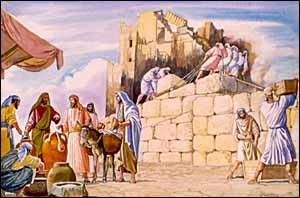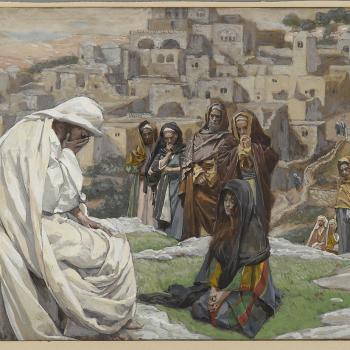Thoughts about Two Readings from the Fifth Sunday of Lent

I was pretty sure I had identified the idiom in last Sundays first reading from Isaiah, and then I was fine with what it said. I wasn’t so happy with the second reading from Paul’s Letter to the Philippians until it occurred to me: He’s using the same idiom.
Remember not the events of the past. (Isaiah 43:18)
What an awful thing for God to say to a Jew, or a Christian and mean it literally! Sunday’s first reading comes from what scholars call Second Isaiah and a time when God’s people first were identifying themselves as Jews. They were a people to whom, especially at that time of captivity, the past meant practically everything. The Exodus, the giving of the Law, and the settlement of the Land never stopped being events that Jews would remember and celebrate. But God was doing something new – freeing the Jews from captivity in Babylon.
It was during what historians have called the Axial Age. Encyclopedia Britannica says the Axial Age
… is the period when, roughly at the same time around most of the inhabited world, the great intellectual, philosophical, and religious systems that came to shape subsequent human society and culture emerged.
There were Greek philosophers, Indian metaphysicians of Hindu and Buddhist varieties, the “100 schools” of Chinese thought, Zoroastrianism. But of all these schools only the Jews conceived of a history that could take a radically new direction. Only Israel’s God would think of doing something new. To emphasize that, God says to forget about the past. God uses a Hebrew idiom, negating one thing, which God doesn’t mean to do literally, to emphasize something else. “Don’t really forget the past, but do really pay attention to what I’m doing now.”
“Rubbish” in St. Paul’s past
Brothers and sisters: I consider everything as a loss because of the supreme good of knowing Christ Jesus my Lord. For his sake I have accepted the loss of all things and I consider them so much rubbish…. (Philippians 3:8-10)
This first part of Sunday’s second reading bothered me at first. Paul seems to be saying about everything in his life, including the Law of Moses, if it isn’t Jesus it’s rubbish. I figure there’s a lot of good in a life that doesn’t know Jesus. Knowing Jesus doesn’t relegate all those things to the rubbish heap but transforms them, graces them. Grace renews, cleanses, prunes, builds on, and perfects nature, but doesn’t destroy it.
Jesus seems to agree. He built on the Jewish Law and also did some pruning. “You have heard that it was said … but I say to you….” (Matthew 5:21-47) But Jesus also said, “Do not think that I have come to abolish the law or the prophets. I have come not to abolish but to fulfill.” (Matthew 5:17)
It occurred to me that Paul must be thinking in the same typically Jewish idiom that the first reading held. Don’t literally throw out all that came before, but do stand in awe of the wonders of now knowing Jesus. At least, that’s what I think Paul must mean. How do new members enrich the Church if their pasts don’t count for anything?
More examples of the same idiom
It’s important not to misunderstand an idiom that apparently denies one thing, but doesn’t really mean to, in order to emphasize another. Often the thing that the idiom denies is exactly the sort of thing that Jesus came in human flesh to save, not deny or destroy. Here are three more examples:
In this is love, not that we loved God but that he loved us and sent his Son to be the atoning sacrifice for our sins. (1 John 4:10)
To another he said, “Follow me.” But he said, “Lord first let me go and bury my father.” But Jesus said to him, “Let the dead bury their own dead; but as for you, go and proclaim the kingdom of God.” Another said, “I will follow you, Lord, but let me first say farewell to those at my home.” Jesus said to him, “No one who puts ;a hand to the plow and looks back is fit for the kingdom of God.” (Luke 9:59-62)
If your hand causes you to stumble, cut it off; it is better for you to enter life maimed than to have two hands and to go to hell, to the unquenchable fire. And if your foot…. (Mark 9:43-48)
And my comments
On the letter writer John’s favorite topic, love: When we love God, it really is love, even though it pales in comparison to God’s prior love for us. John is making a point about God’s love, not ours.
On Jesus’ words to disciples in Luke: One can read the passage as literal history. Jesus may have given such commands and advice. But one wonders if Jesus really would have had disciples turn their backs on family obligations. Perhaps, but even so the passage might have carried its own meaning for Luke and his community, and for us. When we follow Jesus, we are entering upon a new path. Luke’s decision to use these vivid images about plows and burials emphasizes how important that path is. It doesn’t necessarily constrain us in regard to all that is good or even customary in our former lives.
On the strange advice in the Mark passage, where Jesus is certainly doesn’t want anyone to cut off a body part: Interpreters often say this is Semitic exaggeration. I think it’s more striking than that. Jesus’ advice is not just beyond but contrary to reasonable behavior. It forces one to jump immediately to the point, which I don’t think was about sins of hand, eye, or foot. God, who took on human flesh and body, surely wants to save whole bodies. But God doesn’t put up barriers to those who are not quite physically whole. That may have been the point – to challenge the common perception of the blind, maimed, and lame and the priests’ rule that barred such people from the Temple. Jesus spent a lot of time with blind, maimed, and lame people. They are welcome in the Kingdom of God.
Does the Bible always mean what it says? It’s easier to answer this question affirmatively if you understand the idiom.
Image credit: Jesus Walk via Google Images











